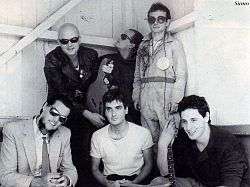Luca Prodan
| Luca Prodan | |
|---|---|
 Prodan photographed for the cover of supplement Sí of Clarín, few days before his death, December 1987. | |
| Background information | |
| Birth name | Luca George Prodan |
| Also known as | Luca |
| Born |
17 May 1953 Rome, Italy |
| Died |
22 December 1987 (aged 34) Buenos Aires, Argentina |
| Genres | Post-punk, Punk rock, New Wave, Reggae |
| Occupation(s) | Musician, singer, songwriter |
| Instruments | Vocals, Guitar, Piano, Bass guitar |
| Years active | 1970s – 1987 |
| Associated acts | Sumo, Patricio Rey y sus Redonditos de Ricota, Andrés Calamaro, Hurlingham Reggae Band, Los Violadores. |
Luca Prodan (17 May 1953 – 22 December 1987) was an Italian–Scottish musician and singer. He was the leader and singer of Sumo, one of the most influential rock bands of Argentina,[1] and is widely considered as one of the most important artists of the last quarter of the twentieth century in this country. He was the older brother of film actor and composer Andrea Prodan.
Biography

Luca Prodan was born in Rome on 17 May 1953,[2] and he had not only Italian origins but Scottish as well.[1] He was born after the return of the Prodan family from China:[2] his father had set up a prosperous business in ancient Chinese pottery that became untenable after the Japanese invasion of China during World War II.[3]
In his youth, his parents sent him to the prestigious Gordonstoun College in Scotland; The same school attended by Prince Charles of Wales: Prodan left a year before graduating. After that, he moved to London.[4]
He moved to London in the 1970s and worked at EMI.[5] While in London, he formed his first band, The New Clear Heads, which shared aesthetics with contemporary punk bands like XTC, The Fall, Joy Division (who inspired the title of the first Sumo album: Divididos por la Felicidad, Spanish for "Divided By Joy" and Wire.[5]
During the 1970s, there were some memorable songs, especially after a meeting with the Argentinean artist and philosopher Eduardo Sanguinetti in 1976, who created a sound assimilated to the aesthetics of minimalism to which Sanguinetti adhered, which can be heard in the classic Mañana en el Abasto and well as others by Sumo.[6] The [[Baudelerian concept of dandysmo can be applied to these poet-artists, with their manners, ways of being, Stoics and far from any trend or fashion, "they were precursors."
In 1981, after a heroin crisis in late 1970s London, he moved to the farm of an old Anglo-Argentine friend, Timmy McKern, in the central hills of Córdoba Province Argentina seeking peace to try to kick his heroin addiction.[5]
After some time at the farm in the Traslasierra valley, he settled in Hurlingham (a suburb of Buenos Aires), where he founded and led Sumo and the Hurlingham Reggae Band.[7]
Death and legacy
Prodan died either of a heart attack or cirrhosis of the liver in Buenos Aires shortly before Christmas 1987.[7]
After his death, he became an icon of Argentine rock culture. Graffiti stating "Luca Not Dead" has been spotted around the world, especially in South America and Europe.
Two posthumous records of pre-Sumo recordings are available and provide an "insider's" view of the artist.[8] Recorded mostly in the Traslasierra region of Córdoba, Argentina (his initial home territory), they bear testimony to his musical influences and inspiration: Peter Hammill, David Bowie, Jim Morrison, Nick Drake, Lou Reed, Ian Dury, Ian Curtis of Joy Division and Bob Marley.[8]
After his death, two bands were formed by former Sumo members: Divididos and Las Pelotas. It is believed that the actual names came after an heated Prodan's answer referring to an eventual Sumo break-up: ""Are we breaking up, you say? Bollocks we are!""; hence Divididos (Spanish for "The Divided") and Las Pelotas (Spanish for "Bollocks").[8]
Discography
With Sumo
- Corpiños en la madrugada [Bras in the Morning] (EP, 1983)
- Divididos por la felicidad [Divided by Joy] (1985)
- Llegando los monos [Here Come the Monkeys] (1986)
- After chabón (1987)
- Fiebre [Fever] (1989)
Solo
- Time Fate Love, recorded in 1980. Released in 1996
- Perdedores Hermosos [Beautiful Losers], recorded in 1981. Released in 1997
References
- 1 2 Argentina Independent, Lo de Luca: Homage to a Rock Star
- 1 2 Biografía de Luca Prodan Retrieved 26 December 2016
- ↑ IMDb. "MIchela Prodan" (in Spanish). Retrieved 26 December 2016.
- ↑ IMDb. "Luca Prodan". Retrieved 26 December 2016.
- 1 2 3 Juan Morris. "A 20 años de su muerte, el mito sigue vivo" (in Spanish). Retrieved 26 December 2016.
- ↑ "Luca el piyo" (in Spanish). Retrieved June 7, 2011.
- 1 2 Biografía de Luca Prodan Retrieved 26 December 2016
- 1 2 3 Jalil, Óscar. "Vida y muerte de Luca Prodan, un mito del rock nacional" (in Spanish). infobae.com. Retrieved 26 December 2016.
External links
| Wikimedia Commons has media related to Luca Prodan. |